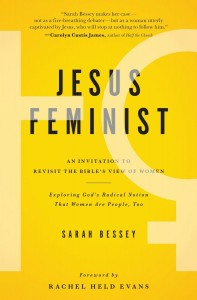These two words, “Jesus” and “feminist,” are not often found in the same sentence–at least not in the evangelical world. And yet, the more I study the Scriptures the more I feel the two belong side-by-side. Wasn’t it Jesus, after all, who let a women sit at his feet to be trained as a Rabbi? Didn’t the power of the resurrection, among other things, empower women? Wasn’t the first evangelist a women? I could go on, but suffice it to say that I find in Jesus, and in his Kingdom, the expression of Paul’s statement “for you [male and female] are one in Christ Jesus” (Galatians 3:28). So why is it that we don’t see the words “Jesus” and “feminist” used together more often? Because, for many, there is a certain stigma attached to the word “feminist”. Bessey understands this, is compassionate towards it, but insists that it is an important enough word to be kept in the Christian vocabulary. I agree. Still, the word feminist is only one of the words in the title, the first word (name) she uses is–Jesus. “Jesus Feminist.” It seems to me that she is using the two words together in two ways. First, she points out that it is Jesus who made a feminist out of her (chapter one). There is some great writing in the book on why feminism makes biblical sense. But secondly, she is a Jesus feminist. Jesus is what centers everything for her, including feminism. She writes, “Biblical equality is not the endgame; it is the means to God’s big ending: all things redeemed, all things restored.” Jesus Feminist–the words belong exactly together. While I think that many women will enjoy this book, I hope that many men will read this as well. As a Pentecostal, I have seen some within the tradition of which I am a part slipping aware from their roots which were laid by bold, passionate, and powerful women, and are instead listening to sermons and reading books by some prominent evangelicals (it’s taking a lot of will power to not name names) who downplay the role that women have in the Kingdom. This is not only a regression in our tradition, it is a regression of the gospel. Bessey is extremely merciful to such people–she is, after all, a Jesus feminist, but she does not back down because of them either–because she is, after all, a Jesus feminist.
Prior to this book I had never read any of Bessey’s work, but I really look forward to reading more from her in the future. There are those who write Christian books who are decent writers but not well informed. Than there are those who are very well informed but are not great writers. Bessey is both. I laughed while reading her book (particularly at her Toronto jokes…I. Am. Canadian), and was also incredibly moved by her storytelling and passionate vision for the Kingdom of God. We need more women, and men, like her.
I received a pre-release copy of this book from netgalley. I look forward to purchasing a physical copy when it releases. I hope you do too.
